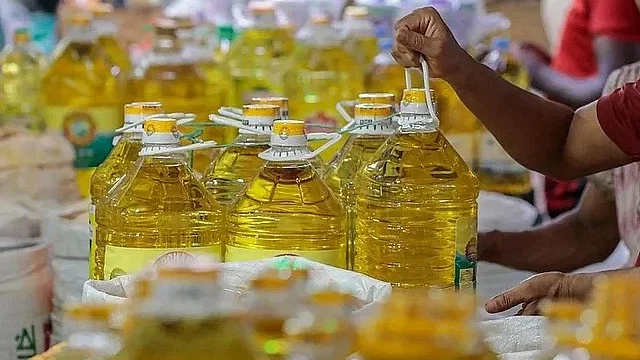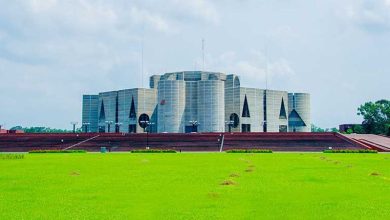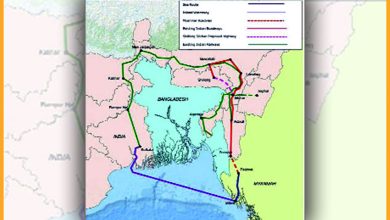Edible oil prices hiked quietly, flour also gets costlier

In addition to soybean oil, flour, and sugar, the prices of several commodities, including rice, broiler chicken, and beef, rose after the national election held on 7 January
Highlights:
- Marketing companies have increased the price of soybean oil by Tk4 per litre without any announcement.
- Normally, oil marketing companies announce price increases or decreases in the market only after receiving permission from the commerce ministry.
- Previously, on 9 September, oil prices were reduced by Tk5 to Tk169 per litre.
- The prices of flour and sugar have increased by Tk5 and Tk15 per kg, respectively.
- The prices of several commodities, including rice, broiler chicken, and beef, rose after the national election held on 7 January
The Bangladesh Vegetable Oil Refiners and Vanaspati Manufacturers Association has quietly raised edible oil prices this time, deviating from their usual practice of announcing rate adjustments, whether an increase or decrease.
Marketing companies have increased the price of soybean oil by Tk4 per litre without any announcement.
At the same time, the prices of flour and sugar have increased by Tk5 and Tk15 per kg, respectively.
In addition to soybean oil, flour, and sugar, the prices of several commodities, including rice, broiler chicken, and beef, rose after the national election held on 7 January.
Retail shops and several superstores in various areas across the capital were seen selling soybean oil at Tk173 per litre, up from Tk169 before the election. A 5-litre bottle is now priced at Tk845, compared to Tk825.
While the 5-litre bottles with the increased price arrived in the market before the election, one-litre bottles appeared in the market after the election.
Regarding the increase in oil prices, suppliers explained that the dollar appreciated in November of last year, rising from Tk110 to Tk122-124. Edible oil refining and marketing companies applied for this price adjustment to the Bangladesh Trade and Tariff Commission on 9 November at that time.
The commerce ministry, Tariff Commission, and traders held a meeting on the matter, but no progress was made regarding the price increase in view of the elections. Traders explained that the dollar now has to be bought for opening letters of credit at Tk126-127, which compelled them to increase prices.
Normally, companies announce price increases or decreases in the market only after receiving permission from the commerce ministry. Previously, on 9 September, oil prices were reduced by Tk5 to Tk169 per litre.
A senior official at an oil, sugar, and flour supplier company told on condition of anonymity, “Given the current state of the dollar and the international supply situation, if the price cannot be increased, they have to count losses. We had to go through this situation because of the election. The situation has become such that if the price is not increased, it will be difficult to supply the products to the market.”
Omar Farooq, a grocer in Badda, commented, “The companies will further increase the price of oil. We used to sell soybean oil at Tk168 a litre before the election, and now it is Tk173. Still, we are not getting a proper supply. Company representatives are reducing supply, citing expectations of further price increases.”
Businessmen say due to the appreciation of the dollar, they were compelled to raise prices. Additionally, extra freight charges have been imposed, and limited shipping in the Red Sea has escalated both freight time and costs, impacting the market.
Md Redhwanur Rahman, Head of Division, Sales and Distribution at Bashundhara Food and Multi Food Products Ltd, told TBS, “Dollar price is the main problem. We have to buy dollars at a higher price than the rate set by the government. If this cost is not adjusted, businessmen will not have the opportunity to do business.”
Along with soybean oil, marketing companies have also increased the price of two kg packets of flour from Tk120 to Tk130. Similar volatility prevails in sugar prices, with sugar per kg packet priced at Tk148 in the market, but traders are selling it in the loose form at Tk155-160. As a result, no packet sugar is available in the market, and loose sugar, in many cases, is being sold at whatever price traders can get.
According to Trading Corporation of Bangladesh market analysis data on 15 January, the price of flour per kg increased by 4.35% in a month. A packet of flour is being sold at Tk65 per kg, up from Tk60.
Md Redhwanur Rahman said, “The impact on us due to complications from the Red Sea may take another month, as we have stock for up to a certain time. Freight charges have already gone up by 10-15%, but the bigger problem is securing ship schedules. The most significant effect will be on wheat.”
Meanwhile, due to instability in the international market, there was instability in the sugar market throughout the last year. There is also a shortage of sugar in the market due to reduced imports. Due to this, the government could not control the price of sugar even by fixing the price.
During a visit to the market, it was found that there was no packet of sugar in Dhaka market. Non-packet sugar is being sold everywhere. Even if one or two companies supply some packets of sugar, the shopkeepers cannot make a profit by selling at the price put on the packet. That is why shopkeepers are selling sugar worth Tk148 for Tk155-160 in the loose form.
Md Musa, a grocer in Eskaton, Dhaka,”The rate of a packet of sugar is Tk148. However, we cannot make a profit of more than Tk1, and buyers will not purchase it for more than that. As a result, we are forced to sell it in loose form.”
The surge in rice prices has even surpassed the crisis in the oil, flour, and sugar markets. A week after the election, the price of rice suddenly increased by Tk2-6 per kg. However, the rice harvest of the Aman season has just concluded, and as per the agriculture ministry’s target, 1.70 crore tonnes of rice are supposed to be added to the supply chain.
According to sources in the commerce ministry, there is a demand for 20 lakh litres of edible oil and 20 lakh litres of sugar every year. If the market cannot be controlled in the current situation, there will be more pressure on consumers in the coming Ramadan. Therefore, the commerce ministry is reportedly taking swift steps to control the market.”
In this situation, retailers said coarse rice was sold at Tk48-50 a week ago, but now it is selling at Tk54. The price of medium-quality fine rice increased from Tk55-58 to Tk60-62, and fine rice varieties like Miniket and Nazirshail increased to Tk68-80 from Tk62-75.
Although the effect started before the election, beef increased from Tk650 to Tk700-750 after the election, and broiler chicken increased from Tk180-190 to Tk200-210. The price of eggs also increased from Tk125-130 per dozen to Tk130-135 during this period.
State Minister for Commerce Ahsanul Islam Titu, “We are taking measures so that no one can create an artificial crisis through stockpiling of products. The Directorate of National Consumer Rights Protection has already been directed to increase market surveillance.”





